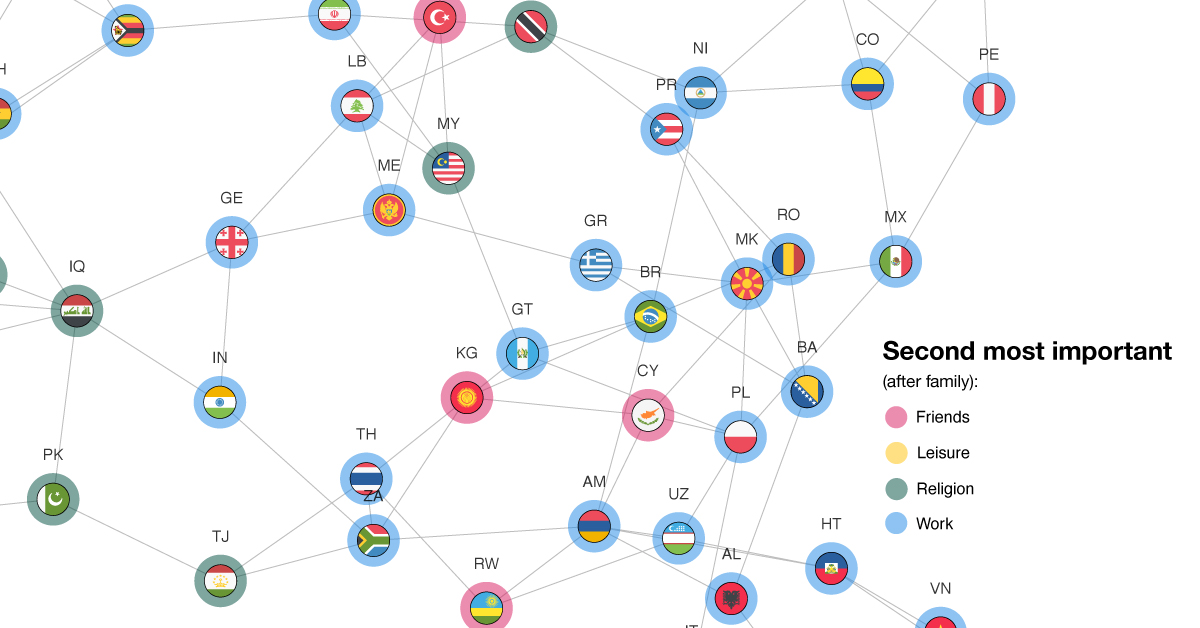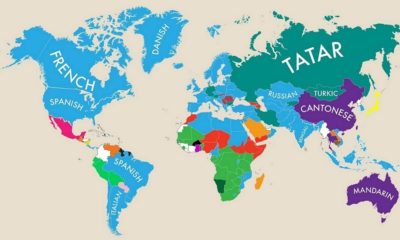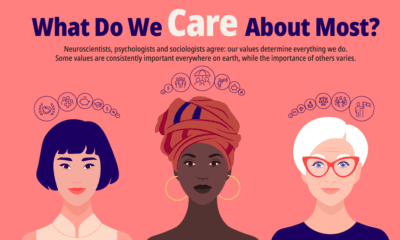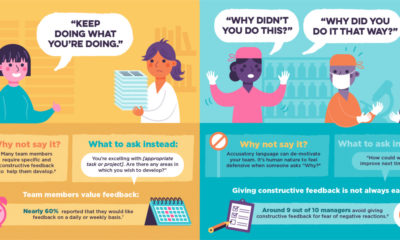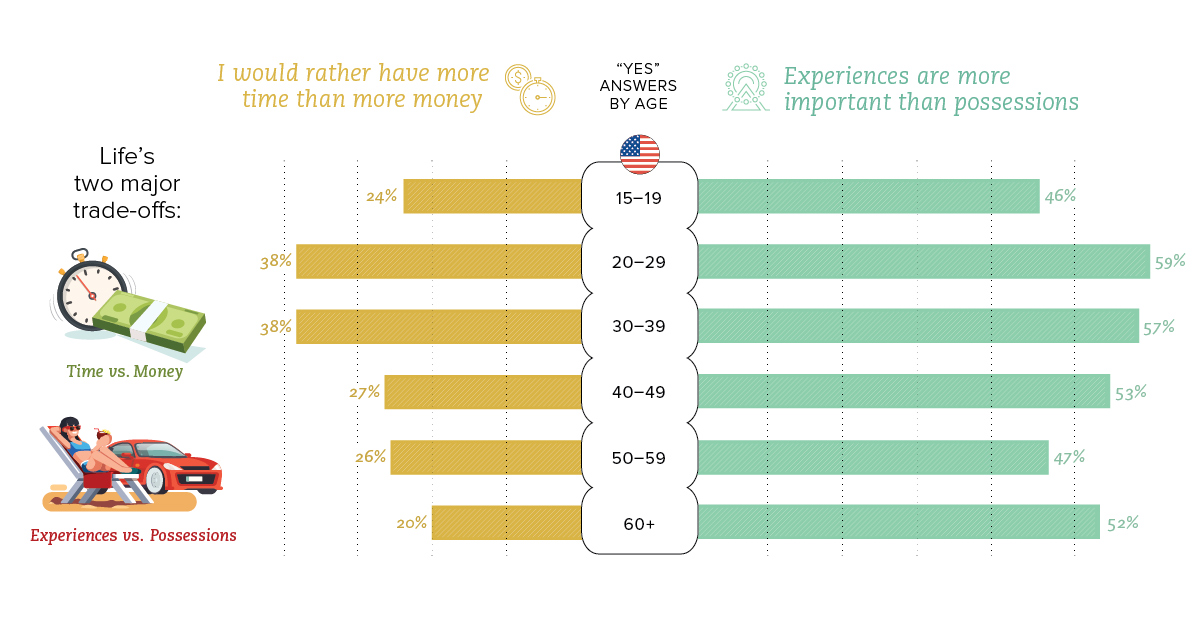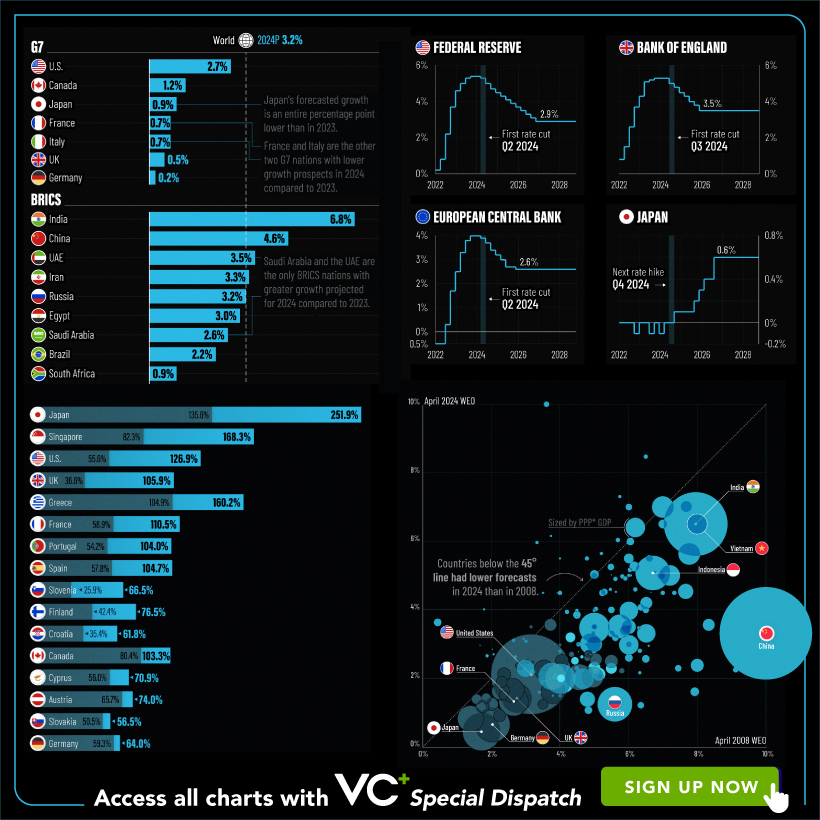Misc
Which Countries Have the Most Similar Values?
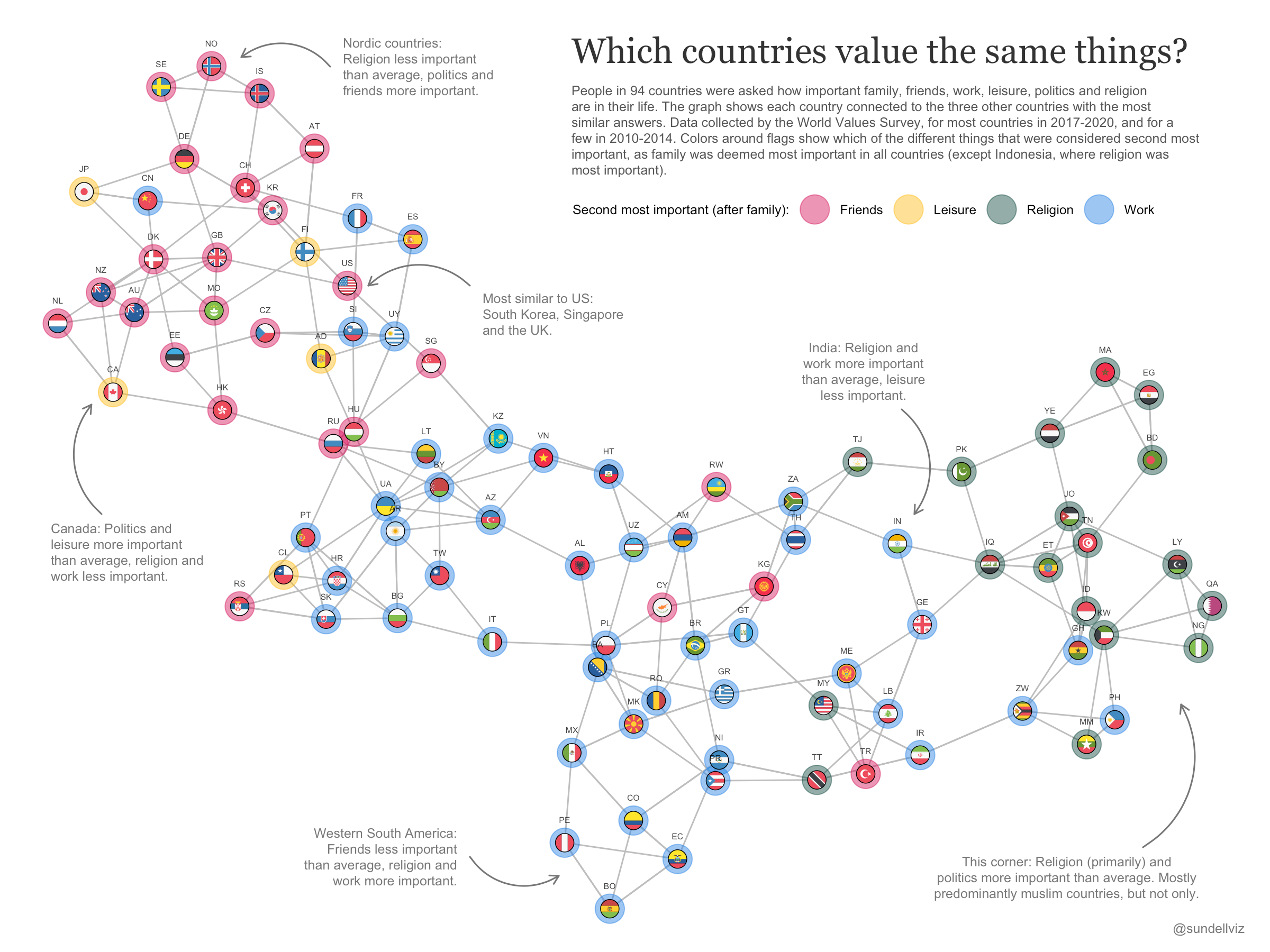
Which Countries Value the Same Things?
Our culture can have significant impacts on our belief systems and our values.
In fact, research has shown that our cultural influences can rewire our brains, which can impact our visual perceptions and how we view the world around us.
Because of this, where we’re from can greatly influence what we prioritize in life. This graphic by Anders Sundell illustrates the primary values of 94 different countries, and highlights which places share similar values.
Methodology
Sundell used data from the World Values Survey, an international survey that interviews hundreds of thousands of participants from across the globe.
For the purposes of this graphic, Sundell focused on one specific section of the survey that asked respondents to rate various aspects of their life on a scale of one (very important) to four (not important at all). Six aspects were included: family, friends, leisure time, politics, work, and religion.
From there, Sundell calculated the median score for each country and identified their primary value, then grouped them based on their similarities. On this netgraph, each country is connected to three other countries that share the most similar values.
Generally speaking, countries that prioritize friends and leisure are concentrated on the far left of the graphic, whereas countries that value religion and work fall more to the right.
Each Country’s Primary Values
Interestingly, family came first for all 94 countries—except Indonesia, where religion was considered most important.
Because of this, Sundell identified each country’s primary value besides family, which was much more diverse across the board:
| Abbr. | Country | Continent | Primary Value (Exc. Family) |
|---|---|---|---|
| AL | 🇦🇱 Albania | Europe | Work |
| AD | 🇦🇩 Andorra | Europe | Leisure |
| AR | 🇦🇷 Argentina | South America | Work |
| AM | 🇦🇲 Armenia | Asia | Work |
| AU | 🇦🇺 Australia | Oceania | Friends |
| AT | 🇦🇹 Austria | Europe | Friends |
| AZ | 🇦🇿 Azerbaijan | Asia | Work |
| BD | 🇧🇩 Bangladesh | Asia | Religion |
| BY | 🇧🇾 Belarus | Europe | Work |
| BO | 🇧🇴 Bolivia | South America | Work |
| BA | 🇧🇦 Bosnia and Herzegovina | Europe | Work |
| BR | 🇧🇷 Brazil | South America | Work |
| BG | 🇧🇬 Bulgaria | Europe | Work |
| CA | 🇨🇦 Canada | North America | Leisure |
| CL | 🇨🇱 Chile | South America | Leisure |
| CN | 🇨🇳 China | Asia | Work |
| CO | 🇨🇴 Colombia | South America | Work |
| HR | 🇭🇷 Croatia | Europe | Work |
| CY | 🇨🇾 Cyprus | Europe | Friends |
| CZ | 🇨🇿 Czech Republic | Europe | Friends |
| DK | 🇩🇰 Denmark | Europe | Friends |
| EC | 🇪🇨 Ecuador | South America | Work |
| EG | 🇪🇬 Egypt | Africa | Religion |
| EE | 🇪🇪 Estonia | Europe | Friends |
| ET | 🇪🇹 Ethiopia | Africa | Religion |
| FI | 🇫🇮 Finland | Europe | Leisure |
| FR | 🇫🇷 France | Europe | Work |
| GE | 🇬🇪 Georgia | Asia | Work |
| DE | 🇩🇪 Germany | Europe | Friends |
| GH | 🇬🇭 Ghana | Africa | Work |
| GR | 🇬🇷 Greece | Europe | Work |
| GT | 🇬🇹 Guatemala | North America | Work |
| HT | 🇭🇹 Haiti | North America | Work |
| HK | 🇭🇰 Hong Kong | Asia | Friends |
| HU | 🇭🇺 Hungary | Europe | Friends |
| IS | 🇮🇸 Iceland | Europe | Friends |
| IN | 🇮🇳 India | Asia | Work |
| ID | 🇮🇩 Indonesia | Asia | Religion |
| IR | 🇮🇷 Iran | Asia | Work |
| IQ | 🇮🇶 Iraq | Asia | Religion |
| IT | 🇮🇹 Italy | Europe | Work |
| JP | 🇯🇵 Japan | Asia | Leisure |
| JO | 🇯🇴 Jordan | Asia | Religion |
| KZ | 🇰🇿 Kazakhstan | Asia | Work |
| KW | 🇰🇼 Kuwait | Asia | Religion |
| KG | 🇰🇬 Kyrgyzstan | Asia | Friends |
| LB | 🇱🇧 Lebanon | Asia | Work |
| LY | 🇱🇾 Libya | Africa | Religion |
| LT | 🇱🇹 Lithuania | Europe | Work |
| MO | 🇲🇴 Macao | Asia | Friends |
| MY | 🇲🇾 Malaysia | Asia | Religion |
| MX | 🇲🇽 Mexico | North America | Work |
| ME | 🇲🇪 Montenegro | Europe | Work |
| MA | 🇲🇦 Morocco | Africa | Religion |
| MM | 🇲🇲 Myanmar | Asia | Religion |
| NL | 🇳🇱 Netherlands | Europe | Friends |
| NZ | 🇳🇿 New Zealand | Oceania | Friends |
| NI | 🇳🇮 Nicaragua | North America | Work |
| NG | 🇳🇬 Nigeria | Africa | Religion |
| MK | 🇲🇰 North Macedonia | Europe | Work |
| NO | 🇳🇴 Norway | Europe | Friends |
| PK | 🇵🇰 Pakistan | Europe | Religion |
| PE | 🇵🇪 Peru | South America | Work |
| PH | 🇵🇭 Philippines | Asia | Work |
| PL | 🇵🇱 Poland | Europe | Work |
| PT | 🇵🇹 Portugal | Europe | Work |
| PR | 🇵🇷 Puerto Rico | North America | Work |
| QA | 🇶🇦 Qatar | Asia | Religion |
| RO | 🇷🇴 Romania | Europe | Work |
| RU | 🇷🇺 Russia | Asia | Friends |
| RW | 🇷🇼 Rwanda | Africa | Friends |
| RS | 🇷🇸 Serbia | Europe | Friends |
| SG | 🇸🇬 Singapore | Asia | Friends |
| SK | 🇸🇰 Slovakia | Europe | Work |
| SI | 🇸🇮 Slovenia | Europe | Work |
| ZA | 🇿🇦 South Africa | Africa | Work |
| KR | 🇰🇷 South Korea | Asia | Friends |
| ES | 🇪🇸 Spain | Europe | Work |
| SE | 🇸🇪 Sweden | Europe | Friends |
| CH | 🇨🇭 Switzerland | Europe | Friends |
| TW | 🇹🇼 Taiwan | Asia | Work |
| TJ | 🇹🇯 Tajikistan | Asia | Religion |
| TH | 🇹🇭 Thailand | Asia | Work |
| TT | 🇹🇹 Trinidad and Tobago | South America | Religion |
| TN | 🇹🇳 Tunisia | Africa | Religion |
| TR | 🇹🇷 Turkey | Asia | Friends |
| UA | 🇺🇦 Ukraine | Europe | Work |
| GB | 🇬🇧 United Kingdom | Europe | Friends |
| US | 🇺🇸 United States | North America | Friends |
| UY | 🇺🇾 Uruguay | South America | Work |
| UZ | 🇺🇿 Uzbekistan | Asia | Work |
| VN | 🇻🇳 Vietnam | Asia | Work |
| YE | 🇾🇪 Yemen | Asia | Religion |
| ZW | 🇿🇼 Zimbabwe | Africa | Work |
After family, work was the most valued, with 46 different countries identifying it as their second-highest priority. Friends came second, followed by religion, and then lastly, leisure.
Work
Almost half of the countries on the list perceive work as the most important aspect of their lives, apart from family.
South American countries, in particular, put an emphasis on work, with seven of nine South American countries valuing work over friends and politics. The only outliers on the continent were Chile (leisure), and Trinidad and Tobago (religion).
Friends
Friends were identified as a top priority in 25 of the 94 countries on the list. Europe in particular valued friendship, especially in Norway and Sweden.
While these Nordic countries prioritize their existing friendships, research shows that they aren’t generally keen on making new ones. A global survey found that expats in Sweden, Norway, and Denmark found it extremely difficult to make new friends.
Religion
18 of the 94 countries ranked religion as a top value.
These countries, mainly in Asia and Africa, are predominantly Islamic except for a few. For instance, in Trinidad and Tobago, the largest religious group is Christianity.
Leisure
Only five countries on the list ranked leisure as a top priority—Japan, Canada, Andorra, Chile, and Finland. Finland takes leisure seriously. Its capital, Helsinki, was recognized as the number one city in the world for work-life balance. And Canada’s capital, Ottawa, ranked sixth on the ranking.

This article was published as a part of Visual Capitalist's Creator Program, which features data-driven visuals from some of our favorite Creators around the world.
VC+
VC+: Get Our Key Takeaways From the IMF’s World Economic Outlook
A sneak preview of the exclusive VC+ Special Dispatch—your shortcut to understanding IMF’s World Economic Outlook report.
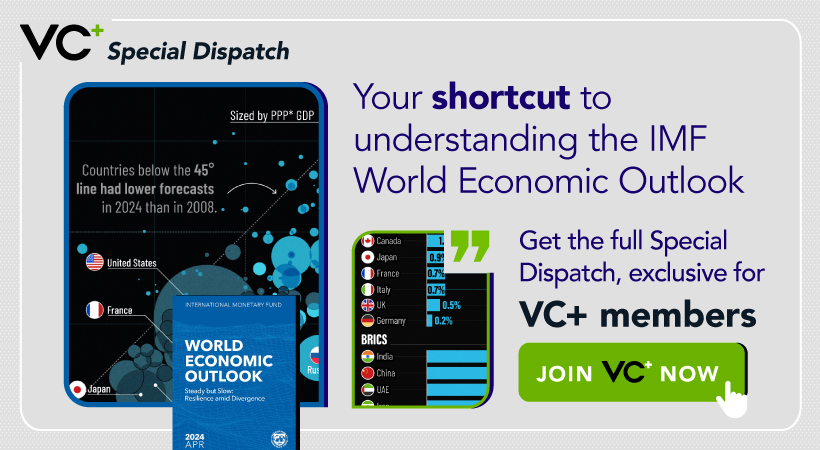
Have you read IMF’s latest World Economic Outlook yet? At a daunting 202 pages, we don’t blame you if it’s still on your to-do list.
But don’t worry, you don’t need to read the whole April release, because we’ve already done the hard work for you.
To save you time and effort, the Visual Capitalist team has compiled a visual analysis of everything you need to know from the report—and our upcoming VC+ Special Dispatch will be available exclusively to VC+ members on Thursday, April 25th.
If you’re not already subscribed to VC+, make sure you sign up now to receive the full analysis of the IMF report, and more (we release similar deep dives every week).
For now, here’s what VC+ members can expect to receive.
Your Shortcut to Understanding IMF’s World Economic Outlook
With long and short-term growth prospects declining for many countries around the world, this Special Dispatch offers a visual analysis of the key figures and takeaways from the IMF’s report including:
- The global decline in economic growth forecasts
- Real GDP growth and inflation forecasts for major nations in 2024
- When interest rate cuts will happen and interest rate forecasts
- How debt-to-GDP ratios have changed since 2000
- And much more!
Get the Full Breakdown in the Next VC+ Special Dispatch
VC+ members will receive the full Special Dispatch on Thursday, April 25th.
Make sure you join VC+ now to receive exclusive charts and the full analysis of key takeaways from IMF’s World Economic Outlook.
Don’t miss out. Become a VC+ member today.
What You Get When You Become a VC+ Member
VC+ is Visual Capitalist’s premium subscription. As a member, you’ll get the following:
- Special Dispatches: Deep dive visual briefings on crucial reports and global trends
- Markets This Month: A snappy summary of the state of the markets and what to look out for
- The Trendline: Weekly curation of the best visualizations from across the globe
- Global Forecast Series: Our flagship annual report that covers everything you need to know related to the economy, markets, geopolitics, and the latest tech trends
- VC+ Archive: Hundreds of previously released VC+ briefings and reports that you’ve been missing out on, all in one dedicated hub
You can get all of the above, and more, by joining VC+ today.
-
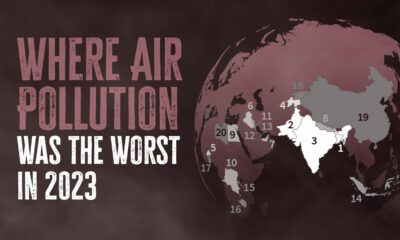
 Green1 week ago
Green1 week agoRanked: The Countries With the Most Air Pollution in 2023
-

 AI2 weeks ago
AI2 weeks agoThe Stock Performance of U.S. Chipmakers So Far in 2024
-

 Markets2 weeks ago
Markets2 weeks agoCharted: Big Four Market Share by S&P 500 Audits
-

 Real Estate2 weeks ago
Real Estate2 weeks agoRanked: The Most Valuable Housing Markets in America
-

 Money2 weeks ago
Money2 weeks agoWhich States Have the Highest Minimum Wage in America?
-

 AI2 weeks ago
AI2 weeks agoRanked: Semiconductor Companies by Industry Revenue Share
-

 Travel2 weeks ago
Travel2 weeks agoRanked: The World’s Top Flight Routes, by Revenue
-

 Countries2 weeks ago
Countries2 weeks agoPopulation Projections: The World’s 6 Largest Countries in 2075

